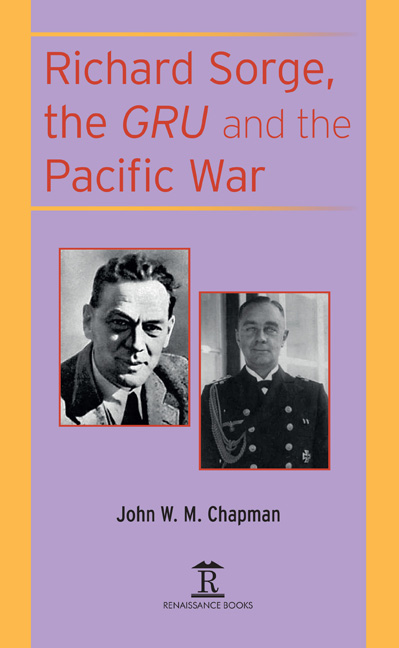Book contents
- Frontmatter
- Contents
- Chart: Organization of the People’s Commisariat for the Defence of the USSR,1941
- Preface
- Introduction
- Abbreviations
- List of Illustrations
- 1 ‘All is Not Well in the Camp of the Axis Powers’: Karl von Wiegand to Hearst Press, 20 November 1941
- 2 ‘In the Matter Affecting Ambassador Ott’
- 3 The Purge of German Journalists
- 4 ‘Expressions which are Psychologically Dangerous’: General Jodl to Admiral Wenneker 24.12.1942
- 5 The Bifurcation of Intelligence in Retrospect, 1929–1937
- 6 The Bifurcation of Intelligence in Retrospect, 1937–1941
- 7 Conclusions
- Select Bibliography
- Source Materials
- Index of Persons
- Index
- List of Contributors
1 - ‘All is Not Well in the Camp of the Axis Powers’: Karl von Wiegand to Hearst Press, 20 November 1941
- Frontmatter
- Contents
- Chart: Organization of the People’s Commisariat for the Defence of the USSR,1941
- Preface
- Introduction
- Abbreviations
- List of Illustrations
- 1 ‘All is Not Well in the Camp of the Axis Powers’: Karl von Wiegand to Hearst Press, 20 November 1941
- 2 ‘In the Matter Affecting Ambassador Ott’
- 3 The Purge of German Journalists
- 4 ‘Expressions which are Psychologically Dangerous’: General Jodl to Admiral Wenneker 24.12.1942
- 5 The Bifurcation of Intelligence in Retrospect, 1929–1937
- 6 The Bifurcation of Intelligence in Retrospect, 1937–1941
- 7 Conclusions
- Select Bibliography
- Source Materials
- Index of Persons
- Index
- List of Contributors
Summary
INITIALLY, AFTER SORGE'S arrest by the Japanese Metropolitan Police on 18 October 1941, the German response in the Tokyo community tended towards a sceptical point of view. In distant Berlin, the German Foreign Ministry at first relied on information from members of the Japanese Embassy: on 4 November 1941, for example, the arrest was confirmed as having been based on written evidence by Counsellor Kase Shunichi (1897–1956) who was told by the German Foreign Ministry desk officer, Dr Karl-Otto Braun, that his superiors ‘are most urgently interested in immediate clarification of the affair and in Sorge's release’ and Under-Secretary Ernst Woermann (1888–1979) wired Ott in Tokyo a promise on the part of Ambassador Ōshima Hiroshi (1886–1975) in Berlin to support his efforts for Sorge's release.
Efforts by Ott to obtain more details of the accusations from the Foreign Ministry and diplomatic access were blocked by the Japanese prosecution and efforts by other German correspondents in Tokyo to do likewise were frustrated, apart from the supply of comforts. In spite of Gaimushō secretiveness, Ott was able to learn that some 300 Japanese citizens had been arrested and this was not followed up until 9 January 1942 when Ott suggested that Ozaki Hotsumi, a former adviser of ex-Premier Prince Konoe, was the main target of Japanese enquiries and that perhaps Sorge ‘got himself ensnared in the intrigues’ involved. Dr Braun also had a conversation with First Secretary Ushiba Nobuhiko (1909–1984) on 18 November 1941 in which Braun put forward as his ‘personal solution’ the suggestion that Sorge's arrest should be rescinded and he be allowed ‘to leave Japan without attracting any attention’, especially as the arrest had been reported by wire to Washington by the German-American journalist, Karl H. von Wiegand (1874–1961) of the Hearst Press, as evidence that ‘all is not well in the camp of the Axis Powers’.
- Type
- Chapter
- Information
- Richard Sorge, the GRU and the Pacific War , pp. 1 - 14Publisher: Amsterdam University PressPrint publication year: 2020



